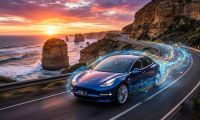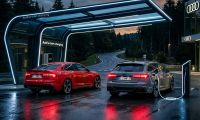BYD and Tesla Sales
An X follower of mine, who goes by the name of Adith Chandra, asked me to write on this subject:
In transparency on BYD’s sales report?! That’d be great! No breakdown on BEV vs hybrid sales, inventory stuffing or true sales? Thanks.
I am going to break this down into the following subject to address this question.
- How many sales of EVs and non-EVs did BYD do in 2023? What is a non-EV for BYD?
- How many sales of EVs did Tesla do in 2023? Does Tesla sell any vehicles that aren't EVs?
- Why didn't BYD break down its sales report into EVs and non-EVs, if BYD is indeed selling non-EV vehicles?
- What is inventory stuffing -vs- true sales, and is BYD doing any inventory stuffing?
Cybertruck Foundation Series #6 Seen In Dense Winter Conditions Sliding On Road As YouTuber With Over 4 Million Subs Showcases Cybertruck Featureshttps://t.co/MnzuqhOp6I$TSLA @Tesla @torquenewsauto #cybertruck #snow #doughnuts #freeadvertising #steerbywire
— Jeremy Noel Johnson (@AGuyOnlineHere) January 6, 2024
Let's start with what BYD said on its own website about the vehicles it sold in 2023:
BYD has concluded 2023 with record-breaking sales volume, which surpasses the 3 million annual sales target and becomes the global new energy vehicle (NEV) sales champion, for the second year in a row. This year also marks BYD being listed among the global top 10 of car sales for the first time. In the Chinese market, BYD retained its position as the best-selling car brand and manufacturer.
December saw sales of 341,043 units, a 45% increase, culminating in a total of 3,024,417 vehicles sold throughout the year, a substantial 61.9% surge from the previous year.
BYD sold over 3 million vehicles, which is impressive and more than Tesla sold in 2023 - but I'll get to Tesla in a minute. This information is directly from BYD's website.
BYD did not break down their sales for EVs and non-EVs. In fact, we can call non-EVS PHEV (plug-in electric vehicle hybrid). PHEV vehicles, which BYD did sell, fill up with gas and generally have a smaller electric battery that can power the vehicle too.
Since BYD didn't break down their sales by EV and PHEV, I went somewhere else to find that information.
I found a Reuters article that mentioned how many of each that BYD sold. Here is what Reuters said (back on January 1st, 2024):
China's BYD Co (002594.SZ), the world's biggest seller of battery electric vehicles (BEVs) and plug-in hybrids, sold about 3.02 million vehicles in 2023, an increase of 61.9%, it said on Monday.
The Shenzhen-based automaker said it sold about 1.6 million battery EVs as well as about 1.4 million plug-in hybrid EVs.
BYD said its battery and hybrid EV sales in December stood at 340,178 including 190,754 all-electric vehicles.
Reuters did not say where they got this information from, however, the total is very close to what BYD said and 3.02 million vehicles appears to be Reuters "rounding" the actual number to make it simpler to read. The actual number sold was 3,024,417.
So, why did BYD on their own website not break it down this way. The reason is that BYD calls their vehicle sales, "New Energy Vehicle" or NEV sales, which I'm assuming means EVs and hybrids (PHEV) vehicles. This is a fancy term to just lump the two together.
You May Also Be Interested In: Cybertruck Sound System Is Epic: "This Is One of Those Vehicles That You Spend $100K On the Sound System, And It Also Comes With a Truck"
Looking At Tesla's Sales
To get Tesla's total vehicles sales, I went to their Investor Relations page for the fourth quarter 2023 and which also showed the total sales for 2023. This was published on January 2nd, 2024.
Tesla had this to say:
AUSTIN, Texas, January 2, 2024 – In the fourth quarter, we produced approximately 495,000 vehicles and delivered over 484,000 vehicles. In 2023, vehicle deliveries grew 38% YoY to 1.81 million while production grew 35% YoY to 1.85 million. Thank you to all of our customers, employees, suppliers, shareholders and supporters who helped us achieve a great 2023.
Tesla also broke down sales by vehicle type - sort of - by grouping some vehicles together. BYD didn't say what vehicles sold what - or if they did, it was buried too deep for me to find.
Tesla's break-down of sales was like so:
Q4 2023
Production | Deliveries | Subject | Lease %
Model 3/Y | 476,777 | 461,538 | 2%
Other Models | 18,212 | 22,969 | 3%
Total Vehicles | 494,989 | 484,507 | 2%
Lease % is simply: Subject to operating lease account, or percent of vehicles leased.
2023
Vehicle Models | Production | Deliveries
Model 3/Y | 1,775,159 | 1,739,707
Other Models | 70,826 | 68,874
Total Vehicles | 1,845,985 | 1,808,581
Tesla showed that they produced 1,845,985 EVs in 2023 and delivered 1,808,581 EVs in 2023. These are pure EVs and not PHEV vehicles. Tesla will never produce anything but an EV (or some other future technology that is still green).
I would love to see Tesla break out their sales by vehicle model so we can see how each individual vehicle is selling. One can hope!
This shows that Tesla was ahead of BYD in pure EV sales for the year, even if BYD beat Tesla in EV sales for Q4 2023.
According to Statista, BYD had 526,409 -vs- Tesla's 484,507 in Q4 2023, so Tesla lost the crown for the quarter - but for the year, 2023, Tesla is still the worldwide king in EVs - despite other news sources reporting that Tesla has fallen behind BYD.
If you count total vehicles produced, BYD IS ahead of Tesla in vehicles produced for the year - but not if you count just EVs. This distinction is important because all gas cars - and PHEV vehicles will eventually be relics and not produced - or if they are produced, in extremely limited quantity as gas/oil is a FINITE resource.
Tesla Insurance Premiums Are Shocking: From 2022 to 2023 In My Tesla Model 3 RWDhttps://t.co/yKHKJuL0WF$TSLA @Tesla @torquenewsauto #model3 #insurance #teslainsurance #premiums #costs
— Jeremy Noel Johnson (@AGuyOnlineHere) January 10, 2024
This brings me to the final part of the question, and that is inventory stuffing -vs- true sales.
Inventory stuffing, according to the Corporate Finance Institute, is:
When a company forces in more products through a distribution channel than the channel is capable of selling, its sales figures become inflated. The practice is known as Channel Stuffing or Trade Loading. The practice of channel stuffing is very deceptive.
Often, this inventory or channel stuffing is done at the end of the quarter or year in order to meet year-end sales targets. The sales targets are calculated on shipment (not delivery) and help the business realize short-term sales. This becomes a problem when goods are returned and future months and quarters report lower sales due to the extra sales reported prior.
Information on this was a bit harder to find, but I did find a post from a "Meet Kevin" on X that explained the following:
Yes, BYD may have sold more BEVs than Tesla in Q4 (526.4k vs 484.5k Tesla), but let's not forget: BYD sells cars at an average of $25,000. Tesla sells them at an average of $46,000. BYD's sell for roughly 46% less than Teslas. But yes, congrats to BYD's 8% beat over Tesla.
Tesla is selling their cars for nearly 50% more than BYD, and staying competitive in total EV sales. An X user posted this in response to his comment:
Also, BYD is probably guilty of some channel stuffing in those numbers. Nothing nefarious, but should be considered with Tesla’s “inventory” levels, ie stuffing their logistics network.
Whether BYD is doing this or not remains to be seen. Certainly, BYD and Tesla are both public companies and have pressure at the end of a quarter to get more vehicles sold. Tesla offered a number of incentives and cost reductions on existing inventory in Q4 2023 to get this done.
As for the answer to BYD doing inventory stuffing - it's possible, but I don't see strong evidence supporting it. However, I will be sure to update in another article if I do!
My verdict is that BYD will probably surpass Tesla in total sales - both overall with EV and PHEV as well as just EV as the years go on due to their much lower cost in vehicles. However, once Tesla gets the compact car out and rolling across the world and solves autonomy, it's lights out for everyone, including BYD (though BYD should lease Tesla's FSD software).
BYD is also a primarily Chinese company and hasn't expanded into the U.S. while Tesla has definitely expanded in China.
This should be Tesla's top priority, as cheaper EVs are a necessity for Tesla to continue to grow.
The Tesla Compact Car: Only Two Falcon Wing Doors, With a Simplified Interior of Only Two Seats - Why This Design Would Accelerate Tesla Productionhttps://t.co/tvU0XQCYEM$TSLA @Tesla @torquenewsauto #evs #compactcar #unboxing #production
— Torque News (@torquenewsauto) December 25, 2023
In Other Tesla News: "A Few Other Products Coming Too" Says Elon Musk, In Addition To Compact Car, FSD, Robotaxi, and Tesla Bot
What do you think about this report between BYD and Tesla? Is Tesla still the EV king, or is BYD taking that crown?
Share this article with friends and family and on social media - or leave a comment below. You can view my most recent articles here for further reading. I am also on X/Twitter where I post more than just articles daily, as well as LinkedIn! Thank you so much for your support!
In transparency on BYD’s sales report?! That’d be great! No breakdown on BEV vs hybrid sales, inventory stuffing or true sales? Thanks
— Adith Chandra (@truthandtitos) January 11, 2024
Hi! I'm Jeremy Noel Johnson, and I am a Tesla investor and supporter and own a 2022 Model 3 RWD EV and I don't have range anxiety :). I enjoy bringing you breaking Tesla news as well as anything about Tesla or other EV companies I can find, like Aptera. Other interests of mine are AI, Tesla Energy and the Tesla Bot! You can follow me on X.COM or LinkedIn to stay in touch and follow my Tesla and EV news coverage.
Image Credit: Free Icons | Wikipedia (BYD) | Wikipedia (Tesla)
Article Reference: BYD | Reuters | Tesla IR | Corporate Finance Institute | Statista | Meet Kevin on X
Set Torque News as Preferred Source on Google












Comments
Petroleum is a finite…
Permalink
Petroleum is a finite resource? What about Lithium, Cobalt, and electricity as in California where they are lacking in enough production to charge your precious EV during certain times. Biased!